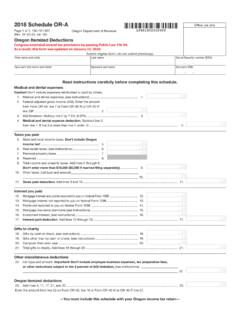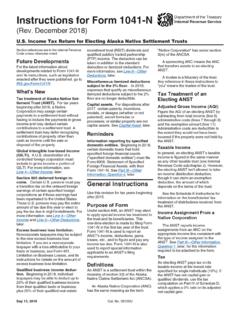Transcription of SPORTS OFFICIALS TAX GUIDE - Genesee County Coaches …
1 SPORTS . OFFICIALS . TAX. GUIDE . SAVE TIME. AND MONEY. ON YOUR. TAXES. Tax Forms and Filing Tips Record-Keeping Log Frequently Asked Questions From Referee and the National Association of SPORTS Of cials TAX. SPORTS . OFFICIALS . GUIDE . SAVE TIME AND MONEY. ON YOUR TAXES. From Referee and the National Association of SPORTS OFFICIALS SPORTS OFFICIALS Tax GUIDE Written by Hal Kaye and Keith Vincent, CPA, CITP. He has been officiating high school and NCAA basketball for more than 20 years. Design and layout by Matt Bowen Copyright 2013 by Referee Enterprises, Inc. 2017 Lathrop Avenue, Racine, Wisconsin 53405. Published jointly by Referee Enterprises, Inc. and the National Association of SPORTS OFFICIALS (NASO). All rights reserved. No part of this book may be reproduced in any form or by any means, except for the inclusion of brief quotations in a review, without permission from the publisher.
2 Printed in the United States of America. Disclaimer This publication is designed to provide accurate and authoritative information in regard to the subject matter covered. It is provided with the understanding that the publisher is not engaged in rendering legal, accounting or other professional service and that the author is not offering such advice in this publication. If legal advice or other expert assistance is required, the services of a licensed professional should be sought. All information was current at the time of publication. Contents Introduction.. 5. Part 1. Understanding the Rules of the Game: Taxation of SPORTS OFFICIALS .. 7. Part 2. income .. 9. Part 3. Expenses.. 10. Part 4. Frequently Asked Questions.. 15. Part 5. Tables and Forms .. 18. Part 6. Game Log .. 29. Introduction The Internal Revenue Service takes a critical look at the income tax filings made by SPORTS OFFICIALS professional and amateur.
3 Referee and the National Association of SPORTS OFFICIALS (NASO) are here to help you prepare for those situations. Information on the taxation of SPORTS OFFICIALS , and how income and expenses are determined and viewed by taxing jurisdictions, is contained within this booklet. The information is only a GUIDE ; you should contact a professional for advice pertinent to your particular situation. How to Use This GUIDE Throughout the following pages, references are made to various tax forms and tables, identified as Exhibits. Samples of those documents are located on pages 18-25 in the Tables and Forms section. SPORTS OFFICIALS Tax GUIDE 5. PART 1. Understanding the Rules of the Game: Taxation of SPORTS OFFICIALS Independent Contractor versus Employee W orker classification is an area of great interest to employers, the federal government, state governments and SPORTS OFFICIALS .
4 Its impact on each of those entities can be very large. Generally, employees are more expensive for employers than are independent contractors. Conversely, a worker's overall tax liability is generally greater if taxed as an independent contractor rather than as an employee. State governments manage unemployment programs that benefit employees but do not benefit independent contractors. This discussion will be limited to the impact on SPORTS OFFICIALS of the employee versus independent contractor issue. There are two main categories of workers employees and independent contractors. Employees are individuals who provide services for employers within an employment relationship. Independent contractors are individuals who provide services outside an employment relationship. They are self- employed. Generally, a worker's status will be determined by the type of business, not the worker, and is sometimes controlled by a matter of law.
5 For example, if OFFICIALS are employees of a school district, that school district should treat them as employees for officiating purposes. The SPORTS official's tax and financial burden will be different if the official is an employee rather than an independent contractor. Tax Considerations (Exhibit 1). When SPORTS OFFICIALS are treated as employees, they report their income as wages on page one of Form 1040. income includes payment for services provided and amounts received for job-related expenses. If the expenses incurred are not reported to the employer or are reimbursed at an amount different from that which would be deductible, the difference would be reported as income . Job-related expenses which an employer does not reimburse or reimburses at an amount less than the actual expense can be claimed as miscellaneous itemized deductions on Schedule A.
6 Those deductions are subject to a floor equal to 2% of adjusted gross income . SPORTS OFFICIALS Tax GUIDE 7. The employee pays income tax on that income through wage withholding based on information provided to the employer on Form W-4. In addition, the employee must also pay Social Security tax at and Medicare at The employee also satisfies the payment of the tax through payroll withholding. The employer matches the Social Security and Medicare tax of each employee. When SPORTS OFFICIALS are treated as independent contractors, they are responsible for payment of their own income taxes as well as Social Security and Medicare taxes. OFFICIALS who receive more than $600 from any individual payer should receive a Form 1099-MISC. Depending on the net amount of officiating income (gross income minus expenses), the official may have to pay those taxes by making estimated tax payments, referred to as quarterly payments.
7 However, the due dates of those payments are not tied to calendar quarters. They are due April 15, June 15, September 15 and January 15. The reason is to get self-employed individuals on a pay-as-you-go system, similar to employees who pay taxes through payroll withholding. The taxes that are due are based on the gross income , less expenses, that are known as of the date of the estimate. If officiating is a part-time or seasonal job, you may be able to satisfy those tax payments through additional withholding from earnings from your primary employment. That keeps things simple and may save a penalty since payroll withholdings are considered paid equally throughout the year, whereas estimated tax payments are considered paid the date they are received by the IRS. Failure to pay sufficient estimated taxes through that method may result in a penalty for underpayment.
8 The self-employment tax for independent contractors is equal to the employer and employee share of Social Security and Medicare taxes, The good news is that one-half of the tax is deductible from gross income . An official who files a tax return as an independent contractor will complete a Schedule C, Profit or Loss From Business (Sole Proprietorship) to determine how much income is subject to income tax and self-employment tax. Another issue for the independent contractor is fringe benefits. An employee is generally taken into account for purposes of the employer's retirement and fringe benefit plans. Accordingly, an employee may be eligible for health insurance, educational assistance and many other tax-advantaged benefits. An employee may also be eligible for unemployment compensation and worker's compensation for job-related injuries or disabilities.
9 Independent contractors generally must provide their own retirement and fringe benefit plans and have no protection when they cannot work due to injury, unless they have purchased disability coverage. Health and disability insurance premiums are deductible for income tax purposes when purchased by an independent contractor. Life insurance is not deductible. 8 SPORTS OFFICIALS Tax GUIDE PART 2. income I f you are being paid as an employee, your income includes payment for services rendered. Employers treat this as wages and these wages are subject to income tax withholding, Social Security and Medicare tax withholding. Wages are reported to you on Form W-2 by January 31 for the preceding calendar year. If your employer is reimbursing you for expenses, they may report them to you one of two ways: One, if your employer is reimbursing your expenses dollar for dollar, any reporting to you by your employer is for information only.
10 The amount is not subject to income tax, Social Security or Medicare tax. You are not required to report those reimbursements as income nor are you allowed a deduction for the expenses. Those amounts offset each other and are not reported on your tax return. Two, if you do not report to your employer your expenses and instead receive amounts to help offset your various expenses ( an expense allowance), your employer will include the reimbursements as income on your Form W-2. In order to deduct your expenses you would need to complete Form 2106 (or 2106- EZ), Employee Business Expenses. Those deductions are subject to a minimum of 2% of Adjusted Gross income (AGI) floor on Schedule A. If your employer pays for your expenses directly, for example, gives you a plane ticket or hotel reservations paid in advance, those items are not income to you unless you negotiate the items for cash and a lesser service.





